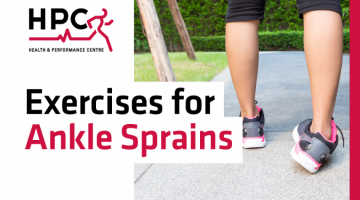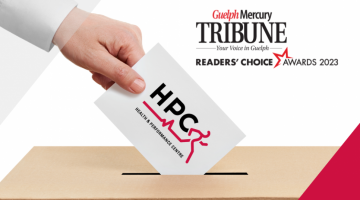HPC in attendance at the 6th International Consensus Conference on Concussion in Sport (ICCCS) in Amsterdam

The Health and Performance Centre's Head Physiotherapist, Craig Dixon, returned this week from the 6th International Consensus Conference on Concussion in Sport (ICCCS) in Amsterdam. As leaders in concussion assessment, treatment and recovery in the Guelph and surrounding area, the HPC continues to invest in training and professional development to ensure its patients are receiving the most up-to-date and medically recognized treatment options available to them, including attending the ICCCS conference.
The ICCCS organization committee (International Olympic Committee (IOC), the International Association Football Federation (FIFA), the International Ice Hockey Federation (IIHF), the International Equestrian Federation (FEI), World Rugby and the International Automobile Federation (FIA)) work together with an independent Scientific Group to curate a conference designed to question, challenge, and develop new protocols in concussion care and recovery to be discussed by the expert panel.
The Conference's purpose is to present a summary of new evidence-based summaries that span the spectrum of concussion and to reach an agreement amongst the expert panel on developing a Consensus Statement on Concussion in Sport (CSCS) which will then be used by physicians and healthcare professionals involved in the care of injured athletes at the recreational, elite or professional level. New evidence evaluated includes identifying concussions, initial management, treatment, return to play protocols, and prevention.
The ICCCS has become the main forum for concussion awareness and prevention in sport since its inception in 2001 and has since led to the publication of the first Sport Concussion Assessment Tool (SCAT) in 2005 (now in its 5th edition). Today, the SCAT5 has gone on to help direct and form the foundations for protocols concerning concussions in many sports organizations, leagues and federations, including the Health and Performance Centre here in Guelph. The SCAT tool is perceived to be one of the most significant efforts by the sports medicine field in addressing concussion treatment and prevention. In the HPC clinic, the SCAT5 assists our practitioners in identifying and evaluating concussions in pro athletes to children (Child SCAT5) as well as a concussion recognition tool (CRT5) which was developed for parents, coaches and others to help with concussion detection. The 2022 Conference discussed the development of the 6th edition of the SCAT tool (SCAT6), which the Health and Performance Centre looks to adopt into practice once it is finalized.
Discussion and session topics included:
Sideline Detection and Follow-Up Assessment
-
Does the SCAT5 10-word list improve the distribution of scores over the SCAT3 5-word list in professional hockey players?, presented by J. Bruce
-
Sport-related concussion blood biomarkers in youth athletes: Do previous concussion, age, sex, menstrual cycle, and sex hormone levels matter? Lecture Reviewing Evidence and Providing Recommendation Ruben Echemendia Panel Discussion with co-authors and audience Q&A, presented by J. Tabor
Concussion Prevention Strategies:
-
What is the relationship between mouthguard use and concussion incidence in professional male rugby union? presented by S. West
-
Clinically important reduction in concussion rate following lowering of the legal tackle height in collegiate rugby union Lecture Reviewing Evidence and Providing Recommendation, presented by J. Brown
-
Follow-up and Office-based Assessment
-
SCAT6 and SCOAT6
Concussion Rest & Exercise and Treatment:
-
Early Exercise is Associated with Faster Concussion Recovery Among Collegiate Athletes: Findings from the NCAADoD CARE Consortium, presented by L. Lempke
-
Treatment of Cervical, vestibular, visual, headache, autonomic, hormonal, mood & behaviour
Persistent Symptoms and Defining Recovery:
-
Factors associated with symptom reporting in collegiate student-athletes without concussion, presented by J. Caccese
-
Predicting persistent symptoms in children (aged 5 to 12 years) with an acute sport-related concussion, presented by M. Osmond
-
Abnormal Cerebral Blood Flow Regulation during 6o Head-Down Tilt after Sport-Related Concussion., presented by M. Haider
Graded Exertion and Return to School/Sport Following a Concussion:
- Differences in return to play time by race and sport type among university student-athletes: findings from the Concussion Assessment, Research, and Education (CARE) Consortium, presented by A. Boltz
- Symptoms, but not cognitive or balance abnormalities during SCAT5 post-concussion screening, are associated with longer return to play time in elite Rugby Union, presented by R. Tucker
Long-Term Sequellae and Criteria for Retirement
- White matter microstructure of the cingulum bundle is associated with visuospatial memory in former professional American football players, presented by E. Bonke
- Recurrent concussion in retired rugby union players is associated with decreased nitric oxide bioactivity, cerebral hypoperfusion and cognitive impairment., presented by T. Owens
Special Considerations for the Child and Adolescent Athlete
You may be interested in these 'Concussion-related Articles' → Vestibular Impacts of a Concussion / Concussion: Visual/Oculomotor / What is a Concussion? / All About Whiplash



